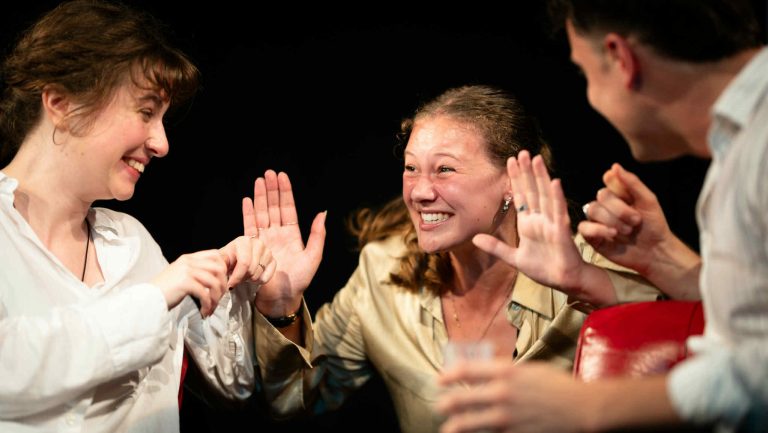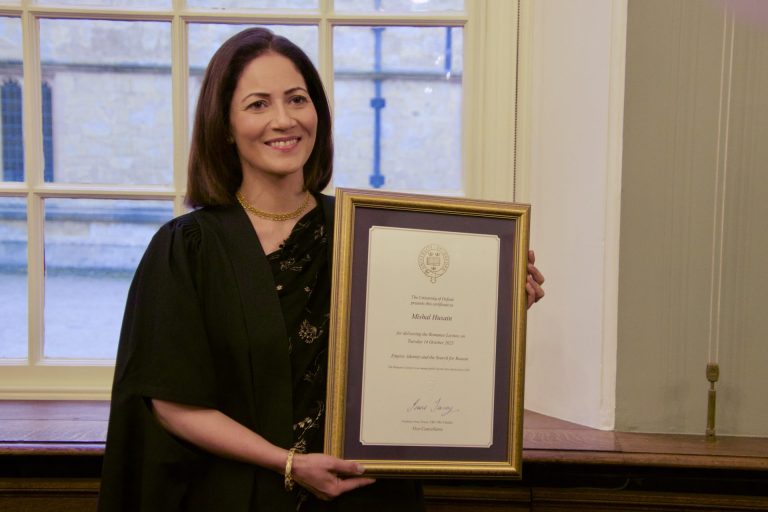Mishal Husain is an award-winning journalist, author, and broadcaster. She was a household name at the BBC for over two decades, working as the broadcaster’s Washington Correspondent and as a presenter on Radio 4’s Today Programme for eleven years. Husain is now Editor at Large at Bloomberg Weekend, and recently launched her first podcast series, The Mishal Husain Show, where she interviews world leaders, business titans, and cultural icons.
Husain describes her Muslim faith as an integral part of her identity, as well as her work as a journalist. She delivered this year’s Romanes Lecture at the University of Oxford, by invitation of the Vice-Chancellor. During the lecture, Husain tied her faith and ancestry to the history of empire, questions of identity, and the search for reason. She talked of ‘searching for light’, which she said is found beyond the headlines – in history and forgotten texts.
Cherwell sat down with Husain whilst she was in Oxford. In between dress rehearsals and touring the Schwarzman Centre, we discussed the theme of her lecture; her career in journalism, and the changing landscape of the news media – from tapes and print, to tweets and reels.
Cherwell: Maybe we could start by talking about the theme of your lecture: ‘Empire, Identity, and the Search for Reason’. What inspired this?
Husain: My starting point was seeing that the first Romanes Lecture was given in 1892, because that date rang a bell with me straight away. The reason was that when I was researching my family story, Broken Threads, I had noted 1892 as being the general election that brought the first Asian MP to the House of Commons, Dadabhai Naoroji, and the fact that this lecture was first delivered in that year by Gladstone, who was, you know, Naoroji was one of his MPs, I just thought: “Oh, what a wonderful bit of serendipity. This date actually means something to me.” And, of course, when you’re asked to give a lecture as prestigious as this, you also feel the pressure to say something that is ideally unique, but certainly meaningful.
I thought, “my professional life as a journalist is why I’ve been asked to do this”. I also have researched the impact of empire on families like mine, both the establishment of the British Empire and the way it came to an end. And when I thought about 1892, I thought this was a moment – the first Asian MP was elected to the House of Commons, this was an imperial subject who ends up being a legislator for the Empire. This is a moment when East and West come together. From there, I started to search for other examples where East and West come together, really challenging the divisions that we’ve seen for many generations, but which feel particularly current now. And that’s why the final part of my lecture is essentially on Islam and Muslims and some of the underappreciated, if not unknown, ways that Islam and Muslims have either influenced this country, or are linked to this country and its culture in perhaps unexpected ways. That’s why I look at architecture and poetry; reason and insight in the Quran; the world wars; and Muslims in the Renaissance.
I wanted to say something that reflected who I am, both who I am as a journalist, and my heritage, particularly the Muslim part of my heritage. The fact is, that particular community is underrepresented in my profession of journalism.
Cherwell: One thing that particularly stood out to me is this idea of identity, and the importance of understanding one another’s identities better. You call, in particular, for reason as a response to misinformation, and I was wondering what the best way is, in your view, of tackling misinformation, and who do you think should be responsible for this – is it journalists, politicians, or perhaps day-to-day users of social media?
Husain: I feel the responsibility to arm yourself with knowledge is part of your duty as a citizen. There is, certainly in relation to Islam and Muslims, I think, a lot of casual misinformation. People’s opinions are formed without either much access to knowledge, or interest in proper knowledge, and that’s why there are numerous myths circulating. There’s no doubt, also, that there are cultural practices and there are individual actions and difficult issues that we should never shy away from discussing. I’m not trying to suggest that there are any areas of public life that should go undebated. I’m arguing for proper discussion. I’ve chosen to focus on what I call, in my lecture, ‘the five points of light’, because I think there’s a lack of bedrock knowledge. I think we’re very keen to see divisions rather than common threads. That’s the message I wanted to get at in this lecture. And I hope what I say offers less discussed points or points of new insight.
Cherwell: On the point of division – one of the things that you’ve, no doubt, seen as a journalist is that the way we consume the news is changing. There’s huge gaps between generations and how we engage with the news. To a lot of young people, or some young people at least, the news is something that old people do. Social media has become a priority. Meanwhile, older generations continue to consume these more traditional kinds of news. What would you say to these young people who say, “Oh, the news is something for older people.” Why does the news matter?
Husain: Well, the news is evolving, and I’ve grown up in what we certainly think of, and see. as traditional news media. I’ve spent most of my career at the BBC, and often that’s called ‘legacy media’ nowadays, usually pejoratively. I’ve seen the whole trajectory of the technological revolution in news. When I joined Bloomberg, and then the BBC, tape was still cut by an actual TV editor. You would take the tape which had come in from the agencies, which had been recorded in-house, and you’d physically run with it to an edit suite, and a videotape editor would cut a 10 second headline for you. So the idea that you’d ever have a device in your own hand which you could film an entire documentary on, or you could go live around the world on, was just nonsensical to me when I was your age. I’ve seen a whole technological transformation. But I certainly think traditional media really has both moved with social media, and has also been massively challenged by it.
I’m launching a podcast, and I think what podcasting has done to the world of information has been revolutionary. I’m now moving into that phase of my professional life. Although the podcast is also going to be filmed, and is going to be on YouTube, and social media. So I think the media of the future is going to have to straddle all these dimensions.
Someone who set out today to have exactly my trajectory, I think would be a very unwise path to go down. That route is not there anymore. I suspect now that if you were setting out as a young producer in a newsroom, as I was in the 90s, what platforms your work goes on would, 10 years down the line, be a bit unknown. TikTok, for example, has come out of nowhere as a news source, as well as a source of other kinds of information. So I think it’s really hard to predict what the landscape is going to be a decade down the line.
But I do believe that good content travels, and I think my core philosophy as a journalist is to do good work in whatever the medium, and for your principles and who you are as a journalist, not to change, because I think that is transferable. I was at the BBC, and as everyone knows the BBC has a certain kind of framework of impartiality. I’m in a different news organisation now with its own set of editorial standards, but who I am as a person hasn’t changed. I am as committed to fairness and accuracy at Bloomberg as I was at the BBC, and I think that’s the zone which every journalist or aspiring journalist needs to be in. They need to ask themselves: “What kind of journalist or content maker do I want to be?” And then you have to find the vehicle or the employer or the platform that fits what you want to do, but equally, be prepared to pivot.
Cherwell: You talked briefly at the start about representation in journalism, and I guess that brings up two things: ‘representation’ in terms of how certain groups in our society, in our country, are portrayed, and also ‘representation’ in terms of who journalists are, who the media is. What more could we be doing to improve representation in the media?
Husain: My podcast, The Mishal Husain Show, is going to be in-depth conversations with newsmakers, or ideas people, or cultural figures. And I think what I’m really trying to get at there is something of the lost art of conversation, the lost art of the long form interview. Obviously things get clipped up and shared in different ways, but I also really hope that a really good conversation is the kind of thing you can really immerse yourself in. But look, representation of all kinds in newsrooms is really important. I’ve been around so many tables where people will spot stories. Either they’ll spot stories which no one else has spotted and you need that. Or they’ll say “no one’s thought about this particular angle on a running story”. Journalism is still a very middle class profession and you might do a story on something like prepayment meters, and you look around a room and realise, actually, there are very few of your colleagues who know what it’s like to pay for your utilities in that way.
So that’s one thing, I think that representation is just really important. You can’t do the best work unless you have enough input from a diverse range of sources. But you also need to have the kind of culture where people can speak up. And I think that’s probably harder to do, because journalism is the kind of profession where the louder voices can command a room. So as editors, as managers, to create the kind of culture where, the person who’s got a thought running through the back of their mind and would really like to say it but feels intimidated, can do so, is such an important thing to do. I think this is often the underappreciated part of representation. It’s not just sitting around the table, but it’s feeling that you’ve got a voice in that particular editorial meeting – you’re not going to be rubbished, you’re not going to be made to feel small.
And of course some newsrooms, some news providers, they’ve got a very particular axe to grind, and they’re not going to be interested in that. But that’s not the kind of place that I’m ever really going to want to work. So that’s not my world. My world is one where I want to feel that different voices have a say, and I want to be challenged by my colleagues, as well as by people watching and listening, because I think ultimately it makes you better at what you do. The harder you have to think about your process and your product – your output – then the better it is likely to be. That’s also what I’m arguing for in the lecture: you know, there’s a long tradition within Islam of an emphasis on reason and insight and thinking, and that’s one of the under-appreciated and little known aspects of the faith. So I feel like how I am as a journalist is linked to my heritage and my upbringing, as well as the places I’ve worked and the people who’ve influenced me professionally.
Cherwell: I know we’re short on time, but can I ask one very quick question: on your very last broadcast of The Today Programme you chose a song, Daydream Believer by the Monkees. Why did you choose it?
Husain: You know, no one’s asked me that, Conor, it’s very good. Why did I choose it? I think I knew I wanted to have music. And then, of course, there’s the question of what will it be? It’s then very hard because you think “people are going to analyse this”. It’s a bit like desert island discs, although there’s only one song.
I think it’s because it starts with the 6 o’clock alarm. So I thought the very beginning of it was for someone who’d been in that early morning world, or that very early morning world, because it was a 3 a.m. alarm, not a 6 o’clock alarm. I felt that worked, and I also really wanted something upbeat and joyful. But I had a few different options on the go, and in the end I settled on that one. I only expected it to run as a little blast. But then my colleagues at Today decided they wanted the whole 3 minutes. I feel like I sent the nation off with a whole load of music that day.
I did think hard about how to say goodbye, because it’s a programme with a unique place in national life, and I was part of it for 11 years. Someone told me the other day that they cried during my enduring goodbye. I was so touched by that – that’s not the only person who said it to me. I thought “how wonderful – this is about the power of audio to reach out and connect you to people who you’d never otherwise meet”. I was very touched by that.











